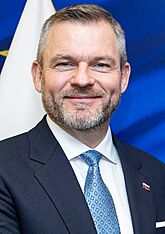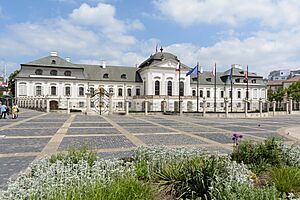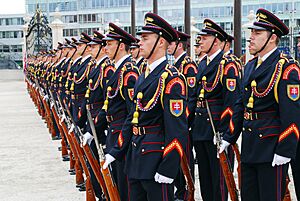President of Slovakia facts for kids
Quick facts for kids President of the Slovak Republic |
|
|---|---|

Presidential standard
|
|
| Style |
|
| Residence | Grassalkovich Palace, Old Town, Bratislava |
| Appointer | Popular vote |
| Term length | Five years,
renewable once consecutively
|
| Constituting instrument | Constitution of Slovakia (1992) |
| Formation | 2 March 1993 |
| First holder | Michal Kováč |
| Succession | Line of succession |
| Salary | c. 204,000 € per annum (2024) Pension for former presidents: c. 48,000 € per annum |
The President of the Slovak Republic is the leader of Slovakia. This person is the head of state and also the commander-in-chief of the country's military. People in Slovakia vote directly for their president. A president serves for five years and can be elected for a maximum of two terms in a row. The president's job is mostly ceremonial, like a symbol for the country. However, the president does have some special powers. The official home of the president is the Grassalkovich Palace in Bratislava.
Contents
History of the Presidency
The role of president was created when Slovakia became an independent country. This happened on January 1, 1993, after Slovakia separated from Czechoslovakia. The position was empty for a short time. Then, on March 2, 1993, Michal Kováč became the first president. He was chosen by the National Council of the Slovak Republic.
In 1998, the National Council could not agree on a new president. Because of this, the job was empty for about six months. During that time, the prime minister and the speaker of the National Council shared the president's duties. To fix this problem, the constitution was changed. After that, people started voting directly for the president. Presidential elections have been held regularly since then.
Peter Pellegrini is the current president. He started his term on June 15, 2024.
What the President Does
The president of Slovakia has a limited role in making new laws. This is because Slovakia is a parliamentary republic. In this system, the prime minister and parliament usually have more power. The president is the main representative of Slovakia. They represent the country both at home and when dealing with other countries.
The president signs and approves international agreements with other countries. Sometimes, the president lets the government handle these agreements. This has been a common practice for many years.
One important power of the president is choosing the prime minister. The constitution does not limit who the president can choose. However, the prime minister's government needs to be approved by the parliament. So, the president usually picks the leader of the party or group that won the most votes in the parliamentary elections.
The president also has the power to appoint certain officials. These include three members of the judicial council. They also appoint one member of the Budget Council. Two members of the Nation's Memory Institute council are also chosen by the president. The president gives out awards and honors. They also appoint the top judges for the Constitutional Court. The president can also grant pardons or parole to people.
The president can say no to (veto) any new law from the National Council. However, the National Council can override this veto. They can do this by voting for the same law again with a majority of all members. This means the president's veto power is not very strong.
The president is officially the commander-in-chief of the Slovak armed forces. But this role is mostly ceremonial. Any big decision the president makes as commander-in-chief needs to be signed by the prime minister or another authorized minister.
Other duties of the president include signing bills into law. They also appoint ministers based on the prime minister's suggestions. The president appoints many other state officials too. These include generals, university professors, judges, and prosecutors.
Sometimes, the president has special power over appointments. For example, presidents have refused to appoint certain officials. The Constitutional Court has supported these decisions.
The president's powers become much stronger in special situations. This happens if the National Council votes that they no longer trust the government. In such cases, the president can approve many government actions. They can also appoint a new government without needing parliament's approval.
Presidents of the Slovak Republic (since 1993)
This section lists the presidents of Slovakia since the country became independent in 1993.
| No. | Portrait | Name (Birth–Death) |
Term of office | Party | Election | ||
|---|---|---|---|---|---|---|---|
| Took office | Left office | Duration | |||||
| 1 | 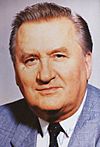 |
Michal Kováč (1930–2016) |
2 March 1993 |
2 March 1998 |
5 years and 0 days | HZDS | 1993 |
| 1998 Slovak presidential election Acting Presidents: Vladimír Mečiar and Ivan Gašparovič (1998), later Mikuláš Dzurinda and Jozef Migaš (1998–1999) |
|||||||
| 2 | 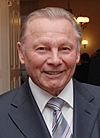 |
Rudolf Schuster (born 1934) |
15 June 1999 |
15 June 2004 |
5 years and 0 days | SOP | 1999 |
| 3 | 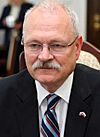 |
Ivan Gašparovič (born 1941) |
15 June 2004 |
15 June 2014 |
10 years and 0 days | HZD | 2004 |
| None | 2009 | ||||||
| 4 | 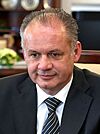 |
Andrej Kiska (born 1963) |
15 June 2014 |
15 June 2019 |
5 years and 0 days | None | 2014 |
| 5 |  |
Zuzana Čaputová (born 1973) |
15 June 2019 |
15 June 2024 |
5 years and 0 days | PS | 2019 |
| 6 | 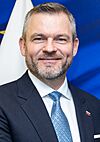 |
Peter Pellegrini (born 1975) |
15 June 2024 |
Incumbent | 1 year and 233 days | Hlas | 2024 |
Presidential Timeline
This timeline shows when each president of the Slovak Republic served.

Acting Presidents
Sometimes, when there is no president, other officials take over the duties. These people are called "acting presidents." Here are some who served in this role:
| Name | Term |
|---|---|
| Vladimír Mečiar Ivan Gašparovič |
2 March 1998 – 30 October 1998 14 July 1998 – 30 October 1998 |
| Mikuláš Dzurinda Jozef Migaš |
30 October 1998 – 15 June 1999 |
Latest Presidential Election
The most recent election for president in Slovakia was in 2024.
| Candidate | Party | First round | Second round | |||
|---|---|---|---|---|---|---|
| Votes | % | Votes | % | |||
| Ivan Korčok | Independent | 958,393 | 42.52 | 1,243,709 | 46.88 | |
| Peter Pellegrini | Voice – Social Democracy | 834,718 | 37.03 | 1,409,255 | 53.12 | |
| Štefan Harabin | Independent | 264,579 | 11.74 | |||
| Krisztián Forró | Hungarian Alliance | 65,588 | 2.91 | |||
| Igor Matovič | Slovakia | 49,201 | 2.18 | |||
| Ján Kubiš | Independent | 45,957 | 2.04 | |||
| Patrik Dubovský | For the People | 16,107 | 0.71 | |||
| Marian Kotleba | Kotlebists – People's Party Our Slovakia | 12,771 | 0.57 | |||
| Milan Náhlik | Independent | 3,111 | 0.14 | |||
| Andrej Danko | Slovak National Party | 1,905 | 0.08 | |||
| Róbert Švec | Slovak Revival Movement | 1,876 | 0.08 | |||
| Total | 2,254,206 | 100.00 | 2,652,964 | 100.00 | ||
| Valid votes | 2,254,206 | 99.53 | 2,652,964 | 99.35 | ||
| Invalid/blank votes | 10,563 | 0.47 | 17,233 | 0.65 | ||
| Total votes | 2,264,769 | 100.00 | 2,670,197 | 100.00 | ||
| Registered voters/turnout | 4,364,071 | 51.90 | 4,368,697 | 61.12 | ||
| Source: First Round, Second Round | ||||||
See also
 In Spanish: Presidente de Eslovaquia para niños
In Spanish: Presidente de Eslovaquia para niños
- List of prime ministers of Slovakia
- List of speakers of Slovak parliaments
- List of presidents of Czechoslovakia


